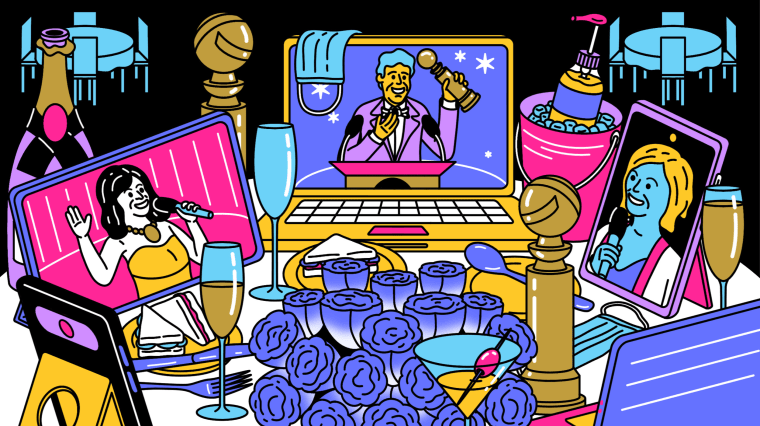In a normal year, the Golden Globes show is the ultimate Hollywood shindig: thousands of glasses of champagne, free-wheeling acceptance speeches, backstage antics, scores of stars hobnobbing at crowded banquet tables.
If the Oscars show the film industry at its most self-consciously formal, the Globes give us Quentin Tarantino spitting out his drink when he loses a directing award to Ben Affleck.
“It’s usually a great big party,” said Anne Thompson, an editor at large at the film publication IndieWire.
But this year — like weddings, office meetings and just about every other event involving people from outside your home — the Globes will be a largely virtual event. In socially distanced style, the co-hosts will appear from opposite sides of the country: Tina Fey from New York City’s Rainbow Room and Amy Poehler at the Beverly Hilton, the ceremony’s traditional home.
The producers of the Globes sent camera kits to nominees that will allow them to beam into the broadcast no matter where they are. The mostly virtual Emmy Awards in late September tried a similar approach. Fey, Poehler, select in-person presenters and other crew members will abide by strict Covid-19 safety protocols.
In an interview with Seth Meyers last month, Poehler joked about the unusual nature of this year’s industry honors. “The prep is going so good. We just have a few final questions, which is: When, how, why, where and what? That’s all we need to find out, but we’re going to figure it out.”
The restrictions required by Covid-19 could mean this year’s Golden Globes (8 p.m. ET Sunday on NBC) lose some of the boozy, off-the-cuff spontaneity of the typical show. “Although people can drink at home,” said Chris Beachum, the managing editor of the awards prediction website Gold Derby.
In particular, the pandemic-era broadcast might deprive viewers of “meme-able” moments that have become more common in the last decade, said Joyce Eng, a senior editor at Gold Derby — such as the viral 2016 GIF of Leonardo DiCaprio appearing to flinch as Lady Gaga brushed past him to accept a statuette.
The awards pundits all said last fall's Emmys, hosted by ABC late-night personality Jimmy Kimmel, provided a solid and largely glitch-free template for the Globes. Beachum said it was particularly entertaining to see winners such as Zendaya and the cast of “Schitt’s Creek” accept awards from remote locations, giving viewers a greater sense of personal connection.
“It was exciting to see somebody win alongside their parents or spouse or children, right there in the room with them,” Beachum said. “You wouldn’t be able to see that in a normal televised ceremony.”
The wider context for this year’s Golden Globes also represents a challenge for producers. The nation is grappling with social and economic crises that might make a Hollywood awards show seem especially out of step, unless the behind-the-scenes gurus find a way to balance self-congratulation with earnestness.
“The question of how such a frothy and frivolous enterprise is going to present itself is interesting,” said Thompson, who has covered awards races for many years. “I’m curious to see how they pull that off. Everybody’s going to want to strike the right tone.”
The ceremony also faces renewed scrutiny. In recent weeks, the Hollywood Foreign Press Association — the organization behind the Globes — has drawn intense criticism because it does not have a single Black member. Sterling K. Brown, Kerry Washington and other actors have spoken up about the lack of diversity in the group.
In the last decade, as conventional linear television lost ground to streaming services, ratings for awards shows have generally declined. (The ratings for the Globes broadcast last January, hosted for the fifth time by Ricky Gervais, were at an eight-year low.)
Eng said she did not expect a viewership bounce for this year’s Globes, although she wondered if the Hollywood glitz might offer a welcome departure from the grim reality.
“It’s been such a downer year, so I think there’s some escapism here: three hours of your Sunday night where you can watch a fun awards show and make fun of celebrities,” Eng said. “Maybe there will be a curiosity factor, too.”
Thompson added that some casual viewers might be drawn in by the sheer number of nominated films and TV shows from popular streaming services — especially Netflix, which amassed a staggering 42 nominations. In a time of theater shutdowns, she said, most filmgoers watched new releases at home.
Two of Netflix’s well-reviewed titles — David Fincher’s “Mank” and Aaron Sorkin’s “The Trial of the Chicago 7” — are considered front-runners for the drama film prize, while the streaming platform’s British royalty saga “The Crown” leads the pack of TV nominees with six nods.

